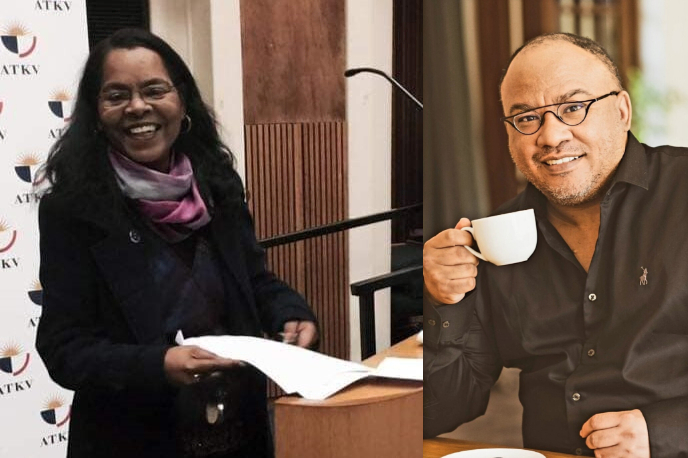I walked into Anastasia de Vries’s Dutch class as an eighteen-year-old in 1996.
Non-legal subjects were mandatory for law students, and it was in her class that our world changed. Starting from our compulsory high school novel, Het Gevaar by Jos Vandeloo, to studying Kaaps and Afrikaans at university, the worlds of Dutch and Kaaps in literature seemed worlds apart. However, through Anastasia, I came to know my language. Then classes with Wium van Zyl, Frank Hendricks, Tana Abrahams, Vernie Plaatjies, Steward van Wyk, and many others followed. In their classes, our unique various language variants, ranging from Overberg to the West Coast, Cape Flats to Okiep, have served as connecting factors that have brought us together, particularly as “coloured people”.
At university, Dutch Language and Literature became a required module in our second year, lasting for an hour on Wednesdays from 13:00 to 14:00 during lunchtime. The B lecture hall would be packed at that time. This small woman managed to bring students together to such an extent that they would even sacrifice their lunch breaks to attend her classes instead of watching the daily Klawerjas tournaments in the student cafeteria.
I was fortunate to receive the Algemeen Nederlands Verbond and the Nederlandse Taalunie prizes for three consecutive years: 1998, 1999 and 2000. However, during 1999 I encountered significant difficulties with Dutch pronunciation, to the extent that I required additional tutoring sessions with Anastasia.
“Sê gou vi’ my ‘Scheveningen’” was her first task.
“Scheveningen,” I repeated.
“Ek sien nou. Jou Duits maak dit veral moeilik. Neeh’ dit kannie soe an’gannie. Kô sit hie’ …”
Then we started with our sessions. We had numerous mentoring sessions to address and overcome the challenges I faced with my German and French code interferences. But most of all, my difficulty with Dutch texts.
Anastasia and I lost contact during my master’s year in 2000.
However, I ran into her again at the 2024 Suidoosterfees.
“Hello Theresa, hello Anastasia,” I said.
Theresa Olivier looked at me and smiled.
Anastasia looked at me, puzzled. “Djy lyk soe bekend …”
“It’s me, Jacques. UWC. ‘90s. Dutch. Stutter.” I responded.
“My got,” she replied. “Where is the long hair, frizzy curls, leather jacket and jeans?”
“Life happened,” I explained.
“I saw on Facebook that you’re famous! Are you still actively involved with Afrikaans?” she asked.
“Yip, but not so much. I am busy. I need to prepare for a conference in Botswana on online technologies and AI; but I’m still connected to Afrikaans. I serve as an ambassador for Graffiti Books.”
“Nou vi’ hoekom praat djy nou skielik Ingels? Voo’ my gan djy nie kô ansittie!” Ana said with a stern yet playful look in her eyes, and then she hurried towards her next show.
Although our encounter that day was brief, I will never forget the impact her support, love and encouragement had on my life. I was orphaned at a very young age. She inspired and motivated me both as a teenager and as an adult to take on the world of academia. The ways she shaped me are far beyond comprehension. I will forever be grateful for our meeting in this lifetime.
A Brief History of Dr Anastasia de Vries
Dr Anastasia de Vries, born in 1960, grew up in Ravensmead on the Cape Flats and studied at the University of the Western Cape where she later in her life became a lecturer in Language Studies as well as in Journalism.
Aside from her work as a journalist and columnist, Dr Anastasia de Vries was involved in literary organisations such as the ATKV and was also a former management committee member of SASNEV, the South African Centre for the Netherlands and Flanders (Die Suid-Afrikaanse Sentrum vir Nederland en Vlaandere).
As an author she was well-known for her books Baie Melk en Twie Sykers and Vroue van Atlantis along with being the co-author of Nuwe Stemme 1 with George Weideman. She has also published numerous research articles on various topics, including Kaapse Afrikaans aka Kaaps aka Afrikaps.
Dr Anastasia de Vries passed away in a hospital on 27 August 2024 after a sudden illness.






